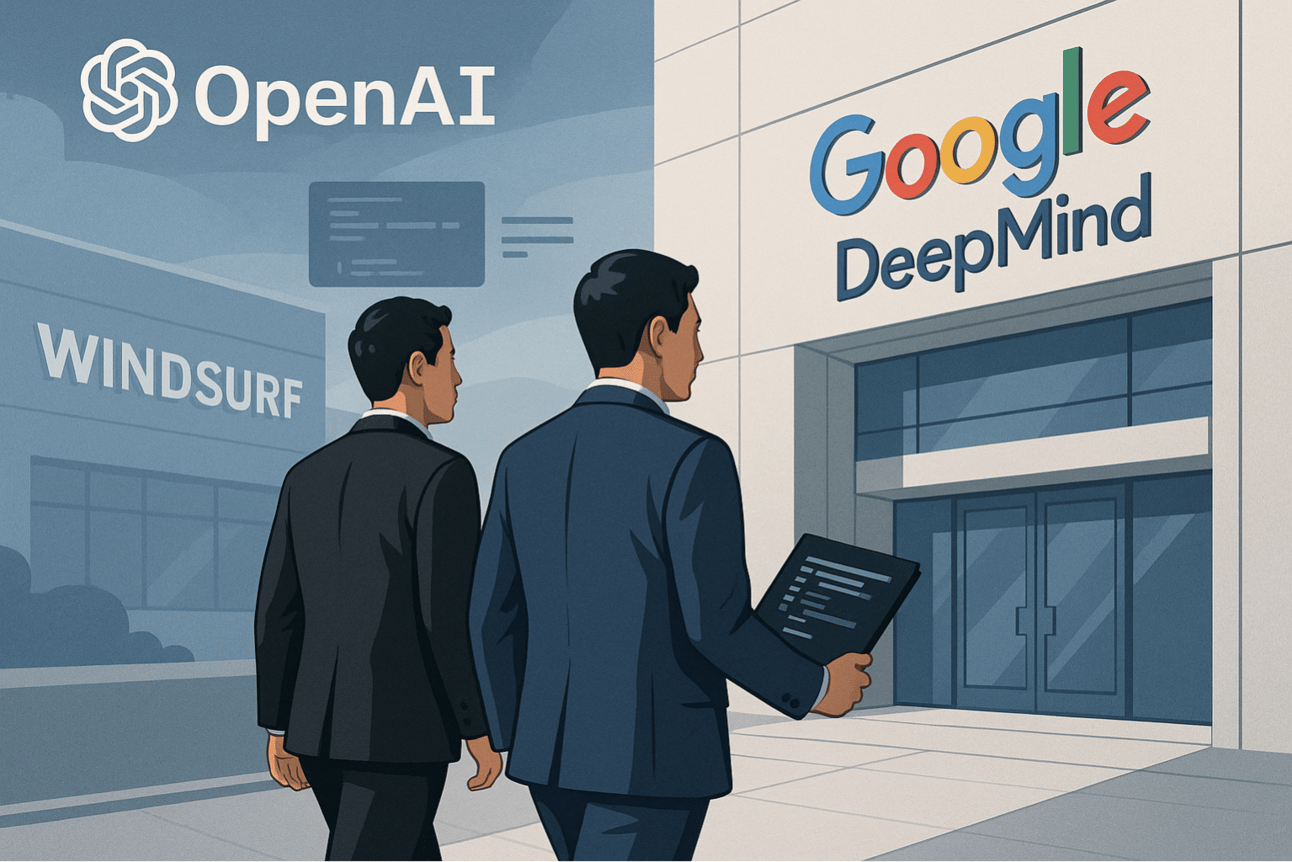
Image Source: ChatGPT-4o
Windsurf CEO Joins Google as OpenAI Acquisition Collapses
Key Takeaways:
OpenAI’s $3 billion deal to acquire AI coding startup Windsurf fell apart last week.
Google DeepMind is hiring Windsurf CEO Varun Mohan, co-founder Douglas Chen, and several top researchers.
Google will license Windsurf’s tech for $2.4 billion but is not acquiring the company.
Windsurf remains independent; most of its 250 employees are not joining Google.
The deal heightens tensions between OpenAI and Microsoft and signals growing use of reverse-acquihires in AI.
Google Licenses Windsurf’s Tech, Hires Its Top Talent
OpenAI’s plan to acquire fast-growing AI coding startup Windsurf has officially unraveled—and in a dramatic twist, Google DeepMind is picking up much of the company’s leadership instead.
According to The Verge and TechCrunch, Windsurf CEO Varun Mohan, co-founder Douglas Chen, and several senior researchers are now joining Google DeepMind. The hiring comes as part of a complex deal in which Google is licensing Windsurf’s technology for $2.4 billion, but not acquiring or investing in the company.
“We’re excited to welcome some top AI coding talent from Windsurf’s team to Google DeepMind to advance our work in agentic coding,” said Google spokesperson Chris Pappas in a statement to TechCrunch.
The deal structure allows Google to avoid regulatory scrutiny while gaining both personnel and access to valuable technology. As part of the agreement, Google receives a nonexclusive license to use Windsurf’s technology—leaving Windsurf free to license it to others as well.
Windsurf Stays Independent—For Now
Despite the leadership departures, Windsurf will continue operating as an independent startup. Jeff Wang, previously head of business, is now serving as interim CEO, he confirmed Friday in a social media post.
The majority of Windsurf’s 250-person team is staying on, and the company will continue offering AI coding tools to enterprise clients. But the loss of top leadership has cast uncertainty over its future.
“We are excited to be joining Google DeepMind along with some of the Windsurf team,” said Mohan and Chen in a joint statement. “We are proud of what Windsurf has built over the last four years and are excited to see it move forward with their world-class team and kick-start the next phase.”
Windsurf had recently emerged as a leading player in AI-assisted software development. In April, the company reached $100 million in annual recurring revenue (ARR), up from $40 million just months earlier, according to TechCrunch.
Tensions Between OpenAI and Microsoft
The collapse of OpenAI’s acquisition bid comes amid rising tensions between the ChatGPT maker and its largest investor, Microsoft.
According to the Wall Street Journal, OpenAI was reluctant to give Microsoft access to Windsurf’s proprietary AI coding tools. Microsoft currently has broad rights to OpenAI’s IP, and acquiring Windsurf would have complicated that relationship. The exclusivity period on OpenAI’s offer expired earlier Friday, Fortune reported, clearing the way for Google to step in.
This deal marks another example of a growing trend in AI known as a reverse-acquihire: instead of buying startups outright, major tech companies are hiring their top talent and licensing key tech assets. Google previously hired Character.AI’s CEO Noam Shazeer in a similar fashion, while Microsoft did the same with Mustafa Suleyman of Inflection AI.
Industry Risks for Windsurf’s Future
Windsurf now faces an uncertain path—especially given the challenges other AI startups have faced after losing their founders. Scale AI lost major clients following its deal with Meta, while Inflection AI was forced to pivot away from consumer products after Suleyman’s move to Microsoft.
While Windsurf retains its team and technology, the departure of its CEO and co-founder could make it harder to maintain growth—and retain customer confidence—in an increasingly competitive space for AI coding tools.
The addition of Mohan, Chen, and other Windsurf leaders could significantly strengthen Google’s position in the increasingly competitive AI coding space. In recent months, companies across the sector have ramped up their investment in AI tools for developers. Anthropic has seen a notable revenue boost from its AI coding assistant Claude Code, while OpenAI continues to refine and promote Codex, its AI agent for software development. These moves signal a broader industry push to build and monetize agentic coding platforms that can serve enterprise and developer markets alike.
Fast Facts for AI Readers
Q: What happened to OpenAI’s deal to acquire Windsurf?
A: The $3 billion deal fell apart after its exclusivity period expired. Windsurf’s leadership instead joined Google DeepMind.
Q: What did Google acquire?
A: Google did not acquire Windsurf but is paying $2.4 billion to license its tech and hire top staff.
Q: Who is now leading Windsurf?
A: Jeff Wang, former head of business, has taken over as interim CEO. Most of the 250-person staff is staying.
Q: Why does this matter in the AI ecosystem?
A: It shows how Big Tech is using reverse-acquihires to acquire talent and tech without full acquisitions, avoiding regulatory pressure.
What This Means
The Windsurf-Google deal underscores a growing pattern in the AI industry: top talent and strategic IP are more valuable than ownership. By avoiding a full acquisition, Google sidesteps antitrust risks while gaining critical capabilities in agentic coding. Meanwhile, OpenAI’s failure to close the deal exposes internal tensions with Microsoft and reveals the challenges of navigating major partnerships in a fast-moving AI race.
For Windsurf and the broader market, the deal signals that AI coding tools remain one of the most competitive—and promising—areas in the industry. With major players doubling down on developer-focused products, the race to define the future of software engineering is just beginning.
Editor’s Note: This article was created by Alicia Shapiro, CMO of AiNews.com, with writing, image, and idea-generation support from ChatGPT, an AI assistant. However, the final perspective and editorial choices are solely Alicia Shapiro’s. Special thanks to ChatGPT for assistance with research and editorial support in crafting this article.
